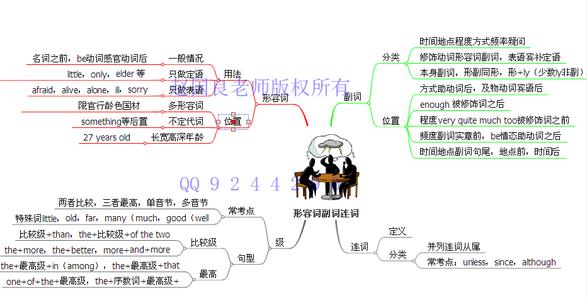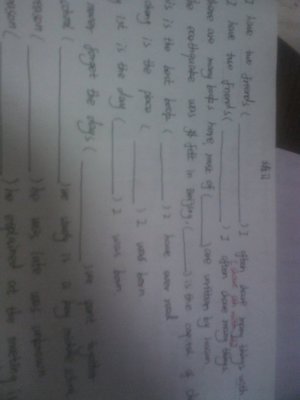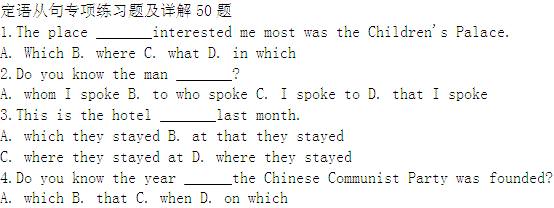因为从句起着名词、形容词和副词的作用,所以一些语法学家把从句分为名词从句(noun clause)、形容词从句(adjective clause)和副词从句(adverb clause)。

地点副词_副词从句 -术语概述
因为从句起着名词、形容词和副词的作用,所以一些语法学家把从句分为名词从句(noun clause)、形容词从句(adjective clause)和副词从句(adverb clause);但从句同时也起着句子成分的作用,因而也有一些语法学家把从句分为主语从句(subject clause)、宾语从句(object clause)和状语从句(adverbial clause)。由此可以看出,副词从句和状语从句是同一概念两种表达术语。副词从句是在句中起副词作用的主谓结构,它可以修饰主句中的动词(a)、形容词和副词(b)或整个主句(c):a. He asked me to stay where I was.
Don't come beforeWe Are Readyfor you.
I'll go wherever the party sends me.
b. She has made greater progress than we expected.
Winter came earlier than it ever did before.
He speaks so clearly that we understand every word he says.
c. No matter what the others may say, I stick to my opinion.
Seeing that the weather has improved, we shall be able to enjoy our game.
副词从句可以用来表示地点、时间、原因、比较、让步、目的和结果等意义。
地点副词_副词从句 -相关词条
1 表示时间、地点的副词从句(Clauses of time and place)
1.1 由when, while, as; until, not until; before, after; whenever等引导的副词从句
a. when, while, as意为"当…时候"。when和as可以表示"点时间",也可以表示"一段时间";while只能表 示"一段时间"。
--When he arrives he'll tell us all about the match.
--When she was a child, she lived in Shanghai.
--While he shaved he thought about the coming interview.
--As they were talking, the rain began. .
--As I left the house I remembered the key. .
--As she came to know him better she relied on him more. .
--As it grew darker it became colder. .
注意:
1.as多用来连接两个逐渐发展或演变的动作或状态。例如:We advance in experience as we advance in years.
2.当as意为"当…时候"时,主要与表示动作或发展过程的动词连用,一般情况下它不与下列动词连用,表示感觉的动词如feel, taste, smell等;表示感情和情绪的动词如admire(respect), appreciate (= value), desire, fear, hate等;表示精神活动的动词如:agree, believe, mean, know, recall, remember, suppose, understand等;表示拥有的动词如belong, own, possess等。
b. till, until
当till和until引导的从句在主句后,且主句的谓语动词含有come, finish, go, reach, return, start等一 时性动作动词时,主句的谓语用否定形式,即not… till (until),其意为"直到…才"。
--I asked Peter not to sign the agreement until he has heard from us. .
--He didn't reach the station until after the train had left. .
--I am afraid I can not finish the work till he arrives.
当主句的谓语是表持续性的动词如:remain, stay, wait等时,主句谓语用肯定形式:
--I'll stay till you come back. .
--Let's wait until the rain stops. .
--We ran and ran, till I thought my heart would burst. .
在句首时,多用until:
--Until you told me, I had no idea of it.
--Not until I had read your letter did I understand the true state of affairs. .
--Not until he came back did I know it.
not until常用于"It was not until… that…"这一强调结构中:
--It was not until I had read your letter that I understood the true state of affairs.
--It was not until he came back that I knew it.
注意:
1.在多数情况下,till和untill可以通用。
2.在till和until所引导的从句中,谓语不可用shall, will或would。
c. before, after
before和after可以用just, right, immediately,sometime, a long time等修饰语修饰,以表示精确的时间。
--I took the examination a year before my brother did. .
--He was still tired even after he had had eight hours of sleeping. .
--I'll do it after I finish this work.
before和after可作介词、副词。
--He was killed in a car accident four years after their marriage.
--Please come before 5 o'clock.
--I never met him before.
--Let me go in and you follow after.
注意:
before作介词用,在表示时间时,不可接一段时间,须接一特定的点时间。
d. whenever(无论何时)
whenever主要用于引导一个频度状语,表示该情景是重复出现的:
--It rains whenever we are camping.
--Whenever that man says "To tell you the truth", I suspect that he's about to tell a lie.
--Whenever we met with difficulties, they came to help us.
whenever引导的时间副词从句时常兼有让步的含义,有时让步的意味比时间的意味还强。例如:
--I'll discuss it with you whenever you like.
--I'd like to see you whenever it's convenient.
注意:
在口语中常用every time代替whenever
--You get younger every time I see you.
--Every time I catch a cold, I have pain in my back.
1.2 由as long as, every time, each time, next time, last time等引导的时间副词从句as long as意为"在…的时候";every time意为"每次";each time意为"每逢…的时候";next time意为"下次";last time意为"上次";by the time意为"在…时候以前"。
--You can never enter this house as long as I live in it.
(我住在这里的时候,你永远不许进入这个房子。)
--As long as (= while) I live, you will not want for anything.
(只要我活在世上,你就不会缺乏任何东西。)
as long as引导的从句有很强的条件含义:
--I'm happy as long as my children are.
--He'll continue working so long as he has the strength.
--She smiles every time she sees me.
--Each time she got into trouble, she would ask me for help.
--I'm going to see him next time he comes to Shanghai.
--He had impressed me the way the first time I met him.
(我第一次碰到他时他就给我这个印象。)
--By the time the alarm went off, I was awake.
--Last time I saw Mary, she said he was going to France.
1.3 由once, as soon as, the moment (that), the instant (that), the minute (that), directly, immediately, instantly引导的副词从句该词组引导的副词从句表示主句的动作在从句的动作一瞬间之后。这组连接词的含义为"一…就…"。
--Once you see her, you will find what I say is true.
--Once you object to a man, everything he does is wrong.
once引导的副词从句同时含有时间和条件意味:
--Once you understand this rule, you will have no further difficulty.
= As soon as you understand this rule, you will have no further difficulty.
= If you understand this rule, you will have no further difficulty.
--She wept aloud as soon as she heard the news.
--The moment she saw me her face lighted up with a smile.
--The instant he opened the door, a dog ran in.
--The minute (that) he saw me, he began to cry.
--I'll give you an answer immediately I've finished reading your file.
--Instantly the button is pressed, the mine explodes.
--Everyone will see the misprint directly they pick the book up.
注意:
the moment, the instant, the minute是名词当连词用,后面可接that,但通常省略;directly,immediately, instantly是副词当连词用。
1.4 由since, ever since引导的副词从句
该组副词从句表示主句动作的开始时间,从句中谓语动词通常用一般过去时态,而主句中谓语
动词通常用现在完成时态。
--I haven't seen John since he returned from Paris.
--It has been raining ever since I came home.
--It has been ten years since my father left home.
--Since I started swimming, I have lost five pounds.
It is … 和It has been… 可以通用。例如:
--It is five years since he joined the army.
--It has been five years since he joined the army.
1.5 由no sooner… than,barely/ hardly /scarcely… when引导的副词从句
该组副词从句表示主句的动作发生在从句的动作一瞬间之前。这组连接词的含义为"一…就…"。
如果把no sooner, barely, hardly, scarcely置于句首就须用倒装结构。
--She had no sooner heard the news than she fainted.
--No sooner had she heard the news than she fainted.
--He had barely arrived at the station when the train began to leave.
--Barely had he arrived at the station when the train began to leave.
--I had scarcely come in when the phone rang.
--Scarcely had I come in when the phone rang.
--We had hardly got into the country when it began to rain.
--Hardly had we got into the country when it began to rain.
注意:
在这组句型中,主句的谓语动词通常用过去完成式,而副词从句的动词通常用过去式。
1.6 由where, wherever引导的表示地点的副词从句
--Where there is no rain, farming is difficult or possible.
--We will meet wherever the committee decides.
--She follows him wherever he goes.
wherever引导的从句有时具有很强的让步含义,特别是当wherever引导的从句放在主句前,而且谓语动词有may或might等情态动词时。
--Wherever you may go, he will not forget you.
everywhere (that)和anywhere (that)也可以引导表示地点的副词从句,其功能和意义和wherever相近。
--Everywhere they appeared there were ovations.
(无论走到哪里,他们都受到热烈欢迎。)
--Everywhere I go, I find the same thing.
--You may go anywhere you like.
注意:
地点副词从句可以放在主句的前面或后面。放在主句前面时,常用逗号把它同主句隔开;如放主句后,就不用逗号隔开。 在
2 表示原因、目的和结果的副词从句(Clauses of cause, purpose and result)
2.1 because, since, as because, since, as是引导表示原因的副词从句最常用的三个词,其中because语气最强, since次之,as语气最弱。
a. because从句通常置于主句之后,强调直接原因;有时也可置于主句之前。
--He was angry because we were late. .
--The fuseblewbecause we have overloaded the circuit.
--Because it was too dark to go on, we camped there.
--Because he wants us to make rapid progress, the teacher is strict with us.
b. 可以用否定词not和并列连词but形成并列because从句:
--I'm going on a trip tomorrow, because I have to, not because I want to.
--Hestole, not because he wanted the money but because he liked.
(他偷东西,并不是因为他想要钱,而是他有这种毛病。)
c. 在强调原因分句时,只能用because从句,而不能用since从句或as从句:
--It was because he was ill that he didn't go with us.
--It is because he has behaved so badly that he must be punished.
注意:
1.在回答以疑问词why开头的问句时,只能用because而不能用since或as。
2.并列连词for从句表示因果关系时,可以和because交替使用。
--could not have seen me, for / because I was not there.
所不同的只是because从句的位置可前可后,而for从句只能后置。
当for从句不表示因果关系,而只是对前面主句的内容加以解释或推断时,这时,because不能代替for。
--It rained last night, for the ground is wet this morning.
d. 由as或since引导的原因副词从句,只是附带说明主句的内容,它通常位于主句之前,但有时也可置于主句之后。
--As he was such a fool, I refused to listen to him.
--As the soup was verysalty, we were thirsty afterwards
(因为这汤很咸,后来我们渴得厉害。)
--As there was very little support, the strike was not successful.
--I left the party at 10 p.m. as I had to get up early the next day.
由于since表示的原因,指的是讲话者和听话者已知的事实,since除有"因为"意义外,还含有"既然" 之意。
--Since he can't answer the question, you'd better ask someone else.
--Since no one is against it, we will adopt the proposal. .
--Since you can't type the letter yourself, you'll have to ask Susan to do it for you. .
--He can't be very tired, since he has walked only half a mile.
2.2 由 now ( that)(因为,既然),seeing that(因为,鉴于),considering that(鉴于,考虑到),in that(因为)引导的表原因的副词从句
--Now (that) you are a big boy, you must behave better.
(既然你是个大孩子了,你的行为必须检点些。)
--Now (that) you have finished the work, you are free to do what you like.
--Seeing that it is raining hard tonight, we will have to stay here for the night.
--Seeing that it seems as if it will rain soon, we had better leave now.
--Considering that he is a boy, I forgive his bad manners.
--He did poorly in his examinations, considering that he had studied hard for them.
--Men differ from brutes in that they can think and speak.
(人与兽类的区别在于人能思维和讲话。)
--The speech is all the more important in that it was made by a man of authority.
注意:
1.在口语里常把now that中的that省去,这时now与表示原因的as和since有相同意义。
2.now (that)引导的副词从句,时间意义很强时,被看作时间副词从句。
--Now that I come to think of it, I see you are right.
3.in that的含义为"in the fact that(因为…的事实)",相当于because。
2.3 由that, so that, in order that, for fear that引导的表示目的副词从句
a. 当主句的动词为现在时、现在完成时或将来时时,that, so that和in order that后从句的谓语多用 may / can / will +动词原形。
--Bring it nearer that I may see it better.
--Ships carry lifeboats so that the crew can escape if the ship sinks.
--These men risk their lives in order that we may live more safely.
--I have lit the fire so that the house will be warm when they return.
b. 当主句的动词为一般过去时、过去进行时或过去完成时时,that, so that和in order that后从句的谓语多用should, could, might或would +动词原形。
--They died that we might live.(他们是为了我们的生存而死的。)
--We arrived early so that we could get good seats.
--He wrote his diary in code so that his wife wouldn't be able to read it.
(为了不让妻子看懂,他用密码写日记。)
--We hid it carefully so that no one should see it.
--We sent the letter by air mail in order that it might reach them in good time.
--In order that no one might enter, the servant locked the door.
c.lest, for fear和in case引导的表目的的副词从句,含义为"以免;唯恐;以防备;为了不"。
--I put away my pistol lest he should touch it.
--Steel and iron products are often coated lest they should rust.
(钢铁制品常常涂以保护层,以免生锈。)
--I'll be kind to her lest she decide to leave me.
--He has been working hard for fear that he should fail in the final exams.
--I bought the car at once for fear (that) he might change his mind.
--Shut the window for fear (that) it may rain.
--You must be quiet in case the fish are frightened.
--Better take more clothes in case the weather is cold.
--You'd better get his room ready in case he should come home today.
注意:
1.lest后从句的谓语多由should +动词原形,有时只用动词原形。
2.for fear (that)后从句的谓语可以用should / might或would +动词原形,或 may / shall / will +动词原形。
3.in case后从句的谓语形式可根据主句谓语形式相应变化;在对从句谈到的事没有足够把握时,可以用should +动词原形。
2.4 由so… that, such… that等表结果的副词从句引导的副词从句
在so… that和such… that中,so是副词,其后可以接动词、形容词、副词;而such为形容词,其后只可接名词。
--She is so honest a girl that all her teachers like her.
--The snow fell so fast that our footsteps were soon covered.
--The bus was so full that I could hardly turn around.
--We left in such a hurry that weforgotto lock the door.
--They had such a fierce dog that no one dared to go near their house.
--He spoke in such low voice that I could not hear him.
--There was so much dust that we couldn't see what was happening.
--So many students complained that the teacher cancelled the pretest.
so放在句首,句子要用倒装语序
--So absorbed was he that Nathalie hadn't dared to make a sound.
--So terrible was the storm that the whole roof was ripped off.
(这场暴风雨真可怕,把整个屋顶全都刮飞了。)
注意:
such不能用于much和many之前。
3 让步、对比副词从句(Clauses of concession, and contrast)
3.1 由even if / even though(即使,虽然)引导的让步副词从句
even if / even though引导的让步从句指事实时,从句的谓语用陈述式;但若从句的内容是对现在
或将来情况的假设,从句谓语用相应的虚拟式。例如:
--Even if I were busy, I would go dancing.(我现在不忙)
--Even if I am busy, I will go dancing. (我现在的确很忙)
--You mustn't be conceited even if you have achieved great success.
--Even if you don't like him, you can still be polite.
(即使你不喜欢他,你仍可礼貌些。)
--Even if I were starving, I would not ask a favor of him.
--I shouldn't have time to see him even though he were here.
--I used to love listening to her, even though I could only understand about half of what she said.
3.2 由 no matter how / what / which等引导的让步从句
a. no matter +疑问词意为"无论…",其后从句谓语可以用may +动词原形或其他相应形式。
--Don't believe therumor, no matter who repeats it
--No matter what you do, don't touch this switch.
--Our aim is to recruit(招聘)the best person for the job, no matter where they are from.
--No matter which you may choose, you will be pleased.
--No matter when the invaders come, they will be wiped out clean.
--No matter how rich people are, they always seem anxious to make more money.
b. 疑问词+ever含义为"无论…",也可同样引导让步副词从句,该从句的谓语可以用may +动词原形或其他相应形式。
--However far it is, I intend to drive there tonight.
--I will go, whatever He may say.
--You will see this product advertised wherever you like.
--Whatever happens don't forget to write.
注意:
1. whatever, however, whichever, whoever; no matter how/ what / which / who所引导的表让步副词从句句意明确时,谓语动词be可省略。
--No matter how high one's official position, one should act as an ordinary worker among the people.
--We are going toseasidewhatever the weather.
--This viewpoint, howeverunderstandable(it is), is wrong.
2. 让步副词从句也常有although, considering that, though, much as, while,whereas(鉴于), however much / good(无论多么多/多么好等引导。
3.3 由whereas, while引导的对比副词从句
whereas和while引导表示对比关系的副词从句时意为"而,却;反之"。
--He is ill, whereas I'm only a little tired.
(他病了,而我只不过稍疲倦罢了。)
--To every child adult approval means love, whereas disapproval means hate.
--Wise men love truth, whereas fools shun it.
(聪明人爱真理,而傻子却逃避它。)
--His wife went out, while he stayed at home.
--Motion is absolute while stagnation is relative.
(运动是绝对的,而静止是相对的。)
--While I did well in class, I was a poor performer at games.
地点副词_副词从句 -种类
1. 时间从句
同时性:tandis que, pendan que, cependant que, tant que, aussi longtemps que, chaque fois que, toutes les fois que, au moment où, à mesure que, 直陈式或条件式表示可能性
主句在后:après que, des que, depuis que, du moment où(que),sit?t que, à peine... que, 直陈式或条件式表示可能性
主句在前:avant que, jusqu’à ce que, jusqu’au moment où (que),en attendant que, sans attendre que, 虚拟式表示设想
意义模糊:quand, lorsque, comme, maintenant que, 特例:que , avant le moment où, en attendant le moment où, 直陈式
2. 原因从句
客观说明原因:parce que, puisque, comme, étant donné que, vu que, du fait que, attendu que,
以前形成原因:dès que, dès lors que, du moment que, 特别的原因:d’autant que, d’autant plus que, surtout que,
表示借口:sous prétexte que, 内涵的原因:tant, tellment, 形式上是并列句,
假想中或已被否定的原因:soit que…soit que, non que...mais, ce n’est pas que, non pas que...mais, 虚拟式
一般情况用直陈式, 表示可能或想象中认为可能的情况时用条件式。
3. 目的从句 (全部要用虚拟式)
主语的意图和目的:afin que, pour que
躲避和摆脱:de peur que, de crainte que, crainte que, par crainte que, par peur que,
否定式:将ne…pas放于从句谓语两侧或者夹在表示目的的从属短语之间,主句是命令句,从句用que引导,从句如果是否定式可单用ne表示否定。
4. 后果从句(黑体字的部分由目的从句转化而来,和主句是否定疑问结构时用虚拟式)
一般后果:de(telle)sorte que, en sorte que, de(telle)fa?on que, de(telle)manière que, sans que, sibienque,
强烈行动产生后果:四种情况
A, 动词加au point que, tellement que, tant que, trop, assez…pour que, B, 形容词加si…que, trop(assez)…pour que,
C, 副词加si…que, tellement que, trop(assez)…pour que, D, 名词加tel…que, tant de…que, trop(assez)de…pour que,
主句是疑问或惊叹句或表示强度时用 que引导,
5. 让步从句(大部分用虚拟式,对立的推测事件用条件式,对立事实用直陈式)
平和的让步:bien que, encore que, quoique, malgré que
强烈的让步:A, quelque, quel加名词加que B, si, tout, queleque, pour加形容词加que
C, si, tout, quelque加副词加que D, qui que, qui que ce soit qui(que), quoi que, quoi que ce soit qui (que)最强烈
与主句对立的让步:A, 时间副词quand, alors que, lorsque, tandis que, pendant que, B, si C, au lieu que, là où,loinque,
中等的让步:que, soi que…soit que
6. 条件从句(黑体字部分用虚拟式, 斜体字部分可用虚拟式或直陈式,划线部分用条件式)
纯粹的可能性,或然性:que, quand, quand même, 纯粹的假设:au cas où, supposé que, en admettant que, à supposer que
假设加上限制:à moins que 最普通的假设:si 条件式按要求 条件加愿望:pourvu que 和数量:pour peu que
假设的交替:soit que…soit que, que…ou que, suivant que(…ou que), selon que…ou que 补充:si tant est que, à(la)condition que, moyennant que,dans le cas où, dans l’hypothèse où, 注意:混合条件式;si引导的从句2个以上时que 替代重复的部分但在其引导的从句中要用虚拟式。
7. 比较从句(一般用直陈式,表示可能和假想时用条件式)
与主句等同一致:comme, ainsi que, de même que, comme si (未完成动作用未完成过去时,完成动作用愈过去时),
与主句的形容词或副词等同一致:aussi…que, autant…que
对主句倾向的衬托:plut?t que, plus que
不同不一致:plus, moins, meilleur, pire, autre, mieux 加que 引导
按比例变化关系:d’autant plus que, d’autant moins que, au fur et à mesure que, dans la mesure où, à proportion que,
8. 增加从句:用outre que 引导, 用直陈式或条件式
9. 限制从句:用excepté que, sauf que, hormis que, hors que, si ce n’est que 引导,
 爱华网
爱华网


